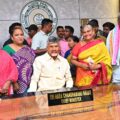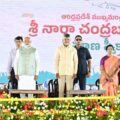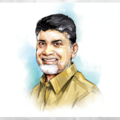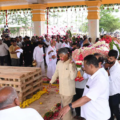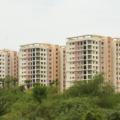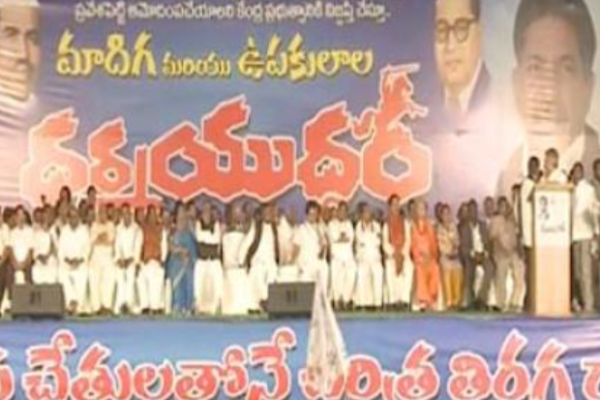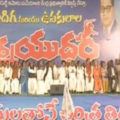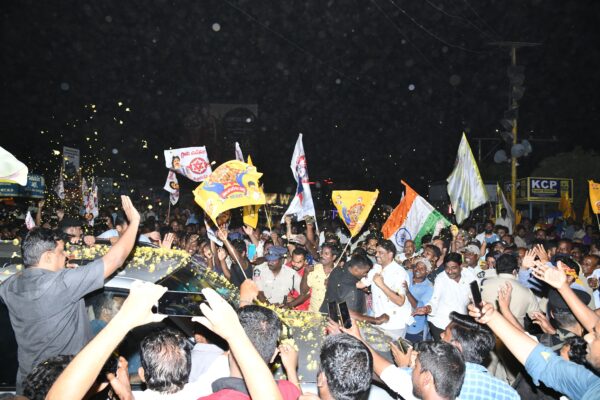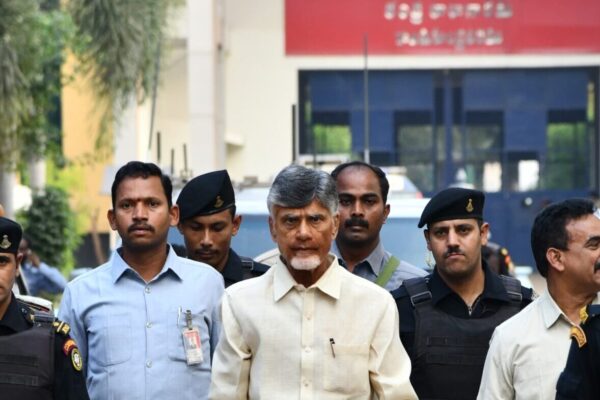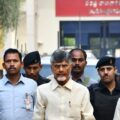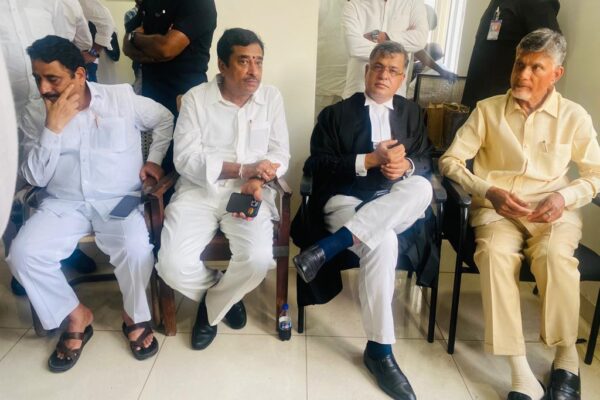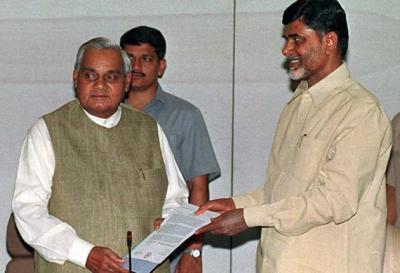
George Iype | Rediff.com | February 8, 2000
Andhra Pradesh Chief Minister Nara Chandrababu Naidu is one person that his counterparts from other states in the country would want to emulate. The reasons for such unprecedented admiration and respect are many. For one, Naidu is high-tech savvy, hard-working, spews business buzzwords and reform jargon, mixes poverty with computers and manages politics with a rare acumen. For many chief ministers, Naidu is a model modern politician, who has created a larger-than life image since he assumed power for the first time way back in 1995.
The busiest manager of southern India’s largest state sleeps for less than three hours every day. He wakes up sharp at 0330 hours and the next 90 minutes are spent on Yoga, treadmill and the sauna. Then he scans the newspapers, jots down items that need to be taken up with fellow politicians and officials. By 0600, Naidu is there in the ground floor office at his Jubilee Hills home.
The first thing he does as he enters his office is to switch on the computer and check the water level in the major reservoirs and power generation. Soon secretaries and officials troop in to brief him of the law and order and the power and water situation. At 0630, all the district collectors in Andhra Pradesh have to be ready for a one-and-a- half-hour long tele-conference with the chief minister. By 0800, Naidu — having dissected the state’s administration — is at the table for a light breakfast of fresh fruit and juice.
The Telugu Desam Party chief lives and breathes big dreams. He wants to make Hyderabad a transit hub between China and Europe. He wants to make the city the financial corridor and the cultural and film capital. But his biggest dream is to make Hyderabad the country’s top infotech destination in the next five years. But will his dreams come true?
Truly, Naidu’s five-year rule has ushered in considerable progress in infotech. Global computer giants like Microsoft, IBM and Oracle have invested in the state. Naidu has nearly computerised most government departments and district headquarters. But look at the state’s villages. Where people die of brain fever due to lack of any healthcare, where drinking water is a scarcity, where the computer buzzwords have not eradicated illiteracy and unemployment.
Will his 21th century vision change things on the ground? “I am confident it will because I will continue to act fast. The maxim that the big eat the small has changed. It is now the fast eating the slow,” says Naidu as he settled down for an exclusive interview withrediff.com Associate Editor George Iype.
You have survived a bitter political battle to become the most successful chief minister in the country. What is the secret of your success?
I have left politics behind in the last millennium, on the campaign trail. Now as chief minister of Andhra Pradesh, I do not want to talk politics. It is time for me to act and work for the development of the state, which I sincerely believe I am doing these days.
My political agenda now is economic — empowerment of the poor and women. My political agenda now is to make Andhra Pradesh an economic powerhouse.
Do you believe that information technology can alleviate poverty?
I am confident that information technology can bring accountability, transparency and quick disposal of cases and redressal of grievances in all the villages. I believe it can alleviate poverty. I see three areas where information technology can be an effective tool: job generation, poverty eradication and wealth generation.
If I am following the infotech path these days, it is because I am convinced that is what is bringing in a revolution in my state’s villages and changing the common man’s life. I have launched the AP State Wide Area Network which connects Hyderabad with all 23 district headquarters. I have launched various other computerisation programmes — like, if a person wants to obtain a birth certificate, it will be made available in five minutes. Computerisation leads to job generation. Computer schools are being set up in all the villages and internet connections are given in all the villages.
You are going ahead with the Vision 2020 programme. How is it progressing?
My Vision 2020 programmes embodies a Simple, Moral, Accountable, Responsive and Transparent government. I call it the SMART government. As per my programme, everybody — politicians, bureaucrats and the people — have to prepare short and long-term plans and then they have to work in that direction. My focus is now not on politics, but on development, the second generation of administrative and economic reforms, information technology and infrastructure projects.
Do you think the Atal Bihari Vajpayee government should also embark on a similar programme?
Certainly. I want the Vajpayee government to launch a Vision 2020 programme for India. I am happy that all the states are now talking about what I am doing here. Look at Karnataka. The Congress party always criticised me for obtaining World Bank loans. Last week, Karnataka Chief Minister S M Krishna himself took the initiative to get huge World Bank loans for various water and infrastructure projects.
All these years, politicians used to deal only in gossip. Making tall promises during elections and forgetting everything about it after the polls. Now there is a good, healthy competition between the states for development. But ultimately, only those who perform and do good work will survive.
Do you like to be called the CEO of Andhra Pradesh?
Why not? There is absolutely nothing wrong in a chief minister being called the CEO of a state. Like a CEO — who have short and long-term visions for their companies — I too have similar plans for my state. I am creating wealth for the people of the state. The 7.5 crore people of Andhra Pradesh are my shareholders. My immediate task is to generate 20 million jobs and reduce population growth from 1.4 per cent to 0.83 per cent. I want to achieve a seven to eight-fold increase in per capita income.
You have made Hyderabad an IT destination. Do you want also to make it a business nerve-centre, an alternative to Bombay?
I want to make Hyderabad an economic and business powerhouse. I want to make Hyderabad a knowledge hub and Andhra Pradesh a knowledge state. When all my projects on tourism, health care, finance and employment are successfully executed, Bombay or any other city or the state will be nowhere near Hyderabad and Andhra Pradesh.
Your critics and Opposition parties say there is so much hype about Hyderabad. For instance, last year, IT exports from Hyderabad amounted to just Rs 30 million compared to the Rs 300 million from Madras.
There is no hype in Chandrababu Naidu. I am following a pragmatic reform policy, which my critics are jealous of. When you compare Hyderabad with Bangalore or Madras, kindly remember that we started our information technology mission only four years back. Whereas IT was there in Bangalore and Madras years back. But look at our growth rate in the IT field. We have been achieving 150 per cent growth in IT every year. It is a fantastic growth.
You have been borrowing money from the World Bank and other sources. How will you manage your increasing debt? Every year, you are paying back Rs 40 billion as debt servicing.
This is one area I have been concentrating on very meticulously these days. Yes, we have been borrowing money for infrastructure projects like roads, irrigation and for social projects for employment generation programmes. We have not only to borrow but repay the money. That is what I am working on now because the results of the projects that I have executed with borrowed money will start pouring in. I am going to augment additional resources for better governance. I know we have to take certain tough decisions to mobilise resources. I am always reviewing the revenue flow and the expenditure.
Despite the revolution that you are creating in information technology, Andhra Pradesh is one state with the highest rate of poverty, unemployment and illiteracy. Do you think your plans and reform processes are not going in the right direction?
My plans to eradicate poverty, illiteracy and to improve the healthcare of the people are in the right direction. These are areas which I am actively engaged in. If you look into the past, these are problems that I inherited. When I took over as chief minister, the state’s finance was in a mess. I launched an economic reform process with the people’s participation.
In my first term as chief minister, I undertook reforms with welfare objectives in mind. In my second term, the second generation reforms that I am implementing will be to achieve harmonious growth of all sectors — financial, natural, human and technological — to root out poverty, illiteracy and unemployment from the state. I am confident I will be able to do it in the next five years.
In 1995, you came out with an industrial policy document. Are you planning an agricultural policy for Andhra Pradesh because the state is largely dependent on agriculture for its economy?
I have already initiated a number of agriculture programmes. We are proposing to introduce the crop insurance scheme for the farmers. We have already set up 90 rytu (farmers) bazaars across the state. All the agriculture markets in the state will also be connected through the wide area network and the internet. The rytu bazaars will be a one-stop shop for the farmers. We are planning to spend Rs 30 billion on irrigation alone. We are also talking to the farmers and their associations to assess whether we need to come out with a separate agricultural policy this year.
Are you in favour of taxing the farming sector?
In fact, before deciding on taxing the farming community, we need to evolve a national consensus on the issue. Right now, I am not in favour of taxing agriculture. No country in the world gets much revenue out of taxing the farmers. We want to promote the agriculture sector so that the proceeds from farmers increase. Small and marginal farmers constitute nearly 80 per cent of the farming community in Andhra Pradesh. I want to invest in extension services and institutional credit flows at low interest rates for the farmers. I want to impart training to market committees, supply farm products at a competitive price and control quality.
On the industrial front, despite reforms, many of the infrastructure projects that you planned have been grounded due to various reasons. How do you propose to help these projects take off?
This is one area of concern for me. I have been successfully marketing the state as an attractive place for investment, especially foreign investment. But some projects have been grounded due to various reasons. We are assessing why and how these failures occurred. We are also planning to evolve a more attractive investment package to the industry by fixing project targets and strict time schedules for file clearance.
We are talking to the industrialists for suggestions and recommendations in various industrial aspects. I am also planning many other programmes to attract investment. Irrigation development is one area of my concern. Harnessing water is the key to developing our rural economy. We have estimated that only 120 per cent of rainwater is used meaningfully in the state. Our effort is to trap rainwater and enhance its usage to about 40 per cent.
One of your areas of development is the empowerment of women. But incidence of women and child labour is the highest in Andhra Pradesh when compared to other states in India. Doesn’t it show that your women empowerment programmes are yet to take off effectively?
I agree that Andhra Pradesh has the highest rate of women and child labour in the country. The problem is actually poverty. Women comprise nearly 50 per cent of our population. Therefore, any reform process and development initiative has to be done by involving women in it. All our social and economic programmes were meant to bring women into the mainstream.
We have already provided one-third quota for women in education and jobs. We have launched a number of projects focusing on their health, clean and better facilities in villages, provision of drinking water, encouraging thrift movement. Our social schemes like Deepam are entirely for the benefit of women. In the last election, we have given more party tickets to women candidates and I have inducted more women into my cabinet. I will fight hard for 33 per cent reservation for women in politics and in Parliament.
Despite your development initiatives, Naxalism continues unabated in the state.
Earlier, the Naxals said they are fighting because the government is doing no social and economic development activities in their areas and villages. In fact, we have launched a number of developmental schemes in the Naxal areas. But now the Naxals are opposing the development work because they want their areas to remain backward.
Naxals stand not for development. Therefore, people do not support them these days. They have refused any negotiation with the government also. So, I am treating the Naxal menace in the state as a law and order problem and we taking strict measures to ensure that their killings stop.
One accusation is that you are pro-rich.
Opposition parties like the Congress say I am pro-rich because politically they have been decimated and they have no issue to fight with me. But look at my social and economic programmes. All of them are for the poor people. So how can the Opposition accuse me of being pro-rich?
You are the TDP president as well as the chief minister. Do you plan to delegate power to your party colleagues?
True, I am for total delegation of powers. I am implementing that in my party. In fact, I am training my party functionaries to equip them to be an efficient and excellent team. I am remaining just as a supervising authority. In my team of party workers, everybody has to work — myself, my ministers, members of the legislative assembly and the local party leaders.
Is the legacy of former chief minister N T Rama Rao over in Andhra Pradesh?
NTR was our leader and he will remain our leader forever. He will always be remembered by the people. People cannot forget him because he has done so much for the people of the state. My political opponents always wanted to create confusion and rift between me and NTR. NTR laid the foundation for our party and it will only grow on that strong foundation.
Are you happy with the Vajpayee government’s performance in the last 100 days? Do you think the government will last for the next five years?
It is not yet time to examine the performance of the Vajpayee government. They are doing OK now. But they have to do much better. I am confident that the Vajpayee government will last for five years.
Do you see yourself as the future prime minister of India?
No. I don’t have any such ideas in my mind. Right now I am interested only in Andhra Pradesh.
